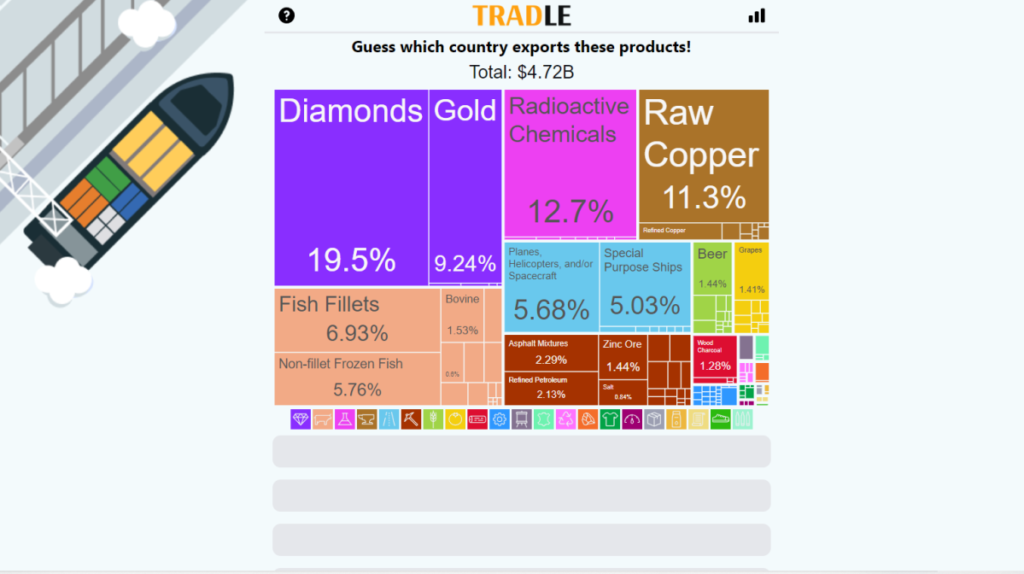In the intricate realm of economists, trade wonks have long reveled in their wonkiness, wielding a secret language of jargon and acronyms that few can decode. However, breaking through the esoteric barriers of trade data has become a playful and educational endeavor, thanks to an online game called Tradle. This digital sensation, borrowing its concept from the popular Wordle game, has transformed the once-exclusive domain of trade wonks into an accessible and engaging experience for everyone.
Tradle Unveiled
Tradle, launched in March 2022 by the Observatory of Economic Complexity (OEC), introduces a colorful matrix known as a treemap, offering a visual breakdown of an unnamed country’s exports. In a format reminiscent of the addictive Wordle game, Tradle challenges participants to guess the country behind the given export data with a limited number of attempts. Each guess is accompanied by hints that reveal the geographic distance between the participant’s guess and the correct answer.
For example, one might ponder, “Which country’s exports consist of 38.9% gold, 28.7% raw cotton, and 12.6% coconuts, brazil nuts, and cashews?” The answer, revealed through Tradle’s engaging interface, is Benin. This amalgamation of entertainment and education not only captivates users but also transforms the understanding of trade data into an accessible and enjoyable pursuit.
The Rise of Tradle in the Global Landscape
Tradle, a brainchild of the OEC, traces its origins back to an MIT master’s thesis in 2012. Today, the OEC, owned by Datawheel, a technology company based in Cambridge, Massachusetts, offers subscriptions to its platform. Gilberto García-Vazquez, Datawheel’s Chief Economist, expressed surprise at Tradle’s rapid success. Launched with more than 1 million page views a month initially, the game has sustained an average of 480,000 monthly views, recently surging above 600,000.
As the demand for understanding the dynamics of global trade intensifies in the face of unprecedented challenges such as pandemics, wars, digital commerce, and climate change, Tradle emerges as a tool that democratizes the comprehension of complex economic phenomena. The game’s popularity underscores a broader trend where individuals from various backgrounds seek to enhance their knowledge of trade patterns and economic intricacies.
The Educational Significance of Tradle
Tradle goes beyond mere entertainment, serving as an educational tool that equips users with a valuable skill set in the ever-evolving landscape of global economics. As the world grapples with transformative forces, including the rapid digitization of commerce and the imperative to address climate change, understanding the movement of goods and services becomes paramount.
By gamifying the comprehension of trade data, Tradle facilitates a more profound engagement with economic principles. Its treemaps and interactive features empower users to grasp the nuances of exports, enabling them to navigate the complex web of global trade relationships. In an era where economic literacy is a key asset, Tradle emerges as a fun and accessible resource for individuals seeking to enhance their understanding of the global economic puzzle.
Conclusion
Tradle, the online game of wonky trade data, has successfully brought the once-exclusive world of economists and trade wonks to the masses. With its engaging format, educational value, and widespread popularity, Tradle serves as a gateway for individuals from diverse backgrounds to delve into the complexities of global trade. As the demand for economic literacy continues to rise, Tradle stands out as a valuable tool, bridging the gap between wonky data and the broader public. In a world undergoing rapid economic transformations, Tradle offers a playful yet insightful lens through which everyone can decode the intricate language of global trade.







